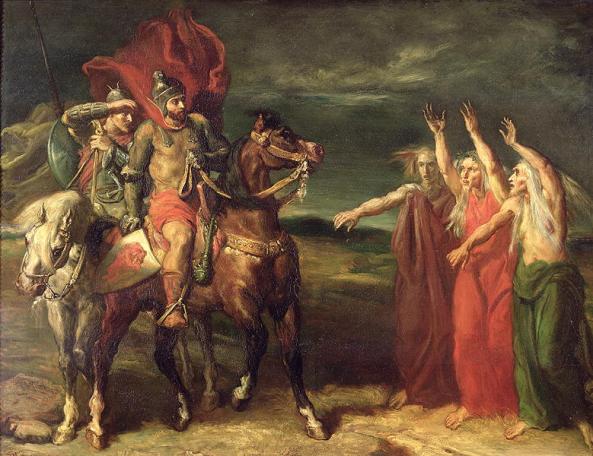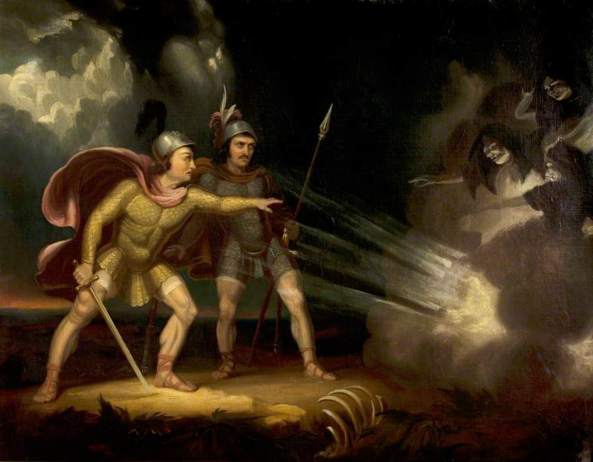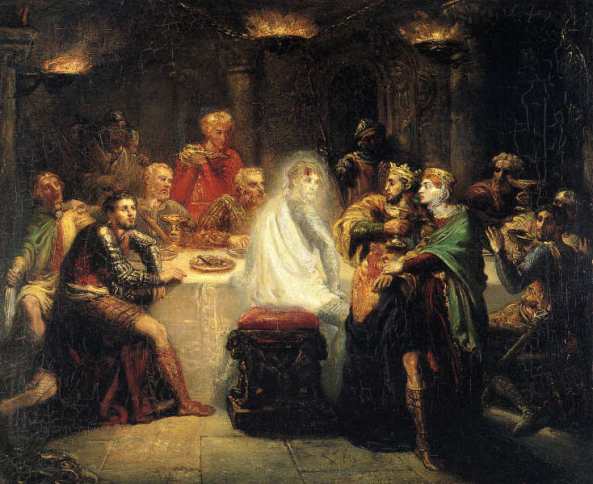Shakespeare wrote Macbeth at a time when interest in witchcraft bordered on hysteria. Witches were blamed for causing illness, death and disaster, and were thought to punish their enemies by giving them nightmares, making their crops fail and their animals sicken.
 The Macbeth and the Three Witches 1855 painting originally painted by Theodore Chasseriau
The Macbeth and the Three Witches 1855 painting originally painted by Theodore Chasseriau
Witches were thought to allow the Devil to suckle from them in the form of an animal, such as ‘Graymalkin’ and ‘Paddock’, the grey cat and the toad mentioned by the Witches in Act 1, Scene 1. Those who were convicted were often tortured, their trials reported in grisly detail in pamphlets that circulated in their hundreds. Often, those accused of witchcraft lived on the edges of society: they were old, poor and unprotected, and were therefore easy to blame.
Στο έργο, οι τρεις μάγισσες αντιπροσωπεύουν το σκοτάδι, το χάος και τη σύγκρουση, ενώ παίζουν και το ρόλο των μαρτύρων. Την εποχή του Σαίξπηρ, οι μάγισσες θεωρούνταν χειρότερες από επαναστάτες, αφού ήταν όχι μόνο πολιτικοί αλλά και πνευματικοί προδότες.
Στο έργο του Σαίξπηρ, οι μάγισσες κινούνται μεταξύ πραγματικότητας και υπερφυσικού. Αψηφούν τη λογική και δεν υπόκεινται στους κανόνες του πραγματικού κόσμου. Οι μάγισσες είναι τόσο βαθιά ριζωμένες στους δύο κόσμους που δεν είναι σαφές αν αυτές ελέγχουν τη μοίρα ή αν είναι αντιπρόσωποί της.
Τα λόγια τους στην πρώτη Πράξη: “Είν’ τα ωραία φρίκη, φρίκη τα καλά / Άνεμοι πάρετέ μας, πάχνη κρύψε μας!“ λέγεται συχνά ότι δίνουν τον τόνο για το υπόλοιπο έργο, δημιουργώντας το αίσθημα της σύγχυσης.
Πράγματι, το έργο είναι γεμάτο με περιπτώσεις όπου το κακό παρουσιάζεται ως καλό, ενώ το καλό καθίσταται κακό. Άλλοι στίχοι κοινωνούν ξεκάθαρα την πρόθεση των μαγισσών να δημιουργήσουν προβλήματα στους θνητούς γύρω τους.
Scene from Roman Polanski’s “Macbeth”
https://www.bl.uk/shakespeare/articles/character-analysis-the-witches-in-macbeth
https://el.wikipedia.org/wiki/%CE%9C%CE%AC%CE%BA%CE%B2%CE%B5%CE%B8

Macbeth (/məkˈbɛθ/; full title The Tragedy of Macbeth) is a tragedy by William Shakespeare; it is thought to have been first performed in 1606. It dramatises the damaging physical and psychological effects of political ambition on those who seek power for its own sake. Of all the plays that Shakespeare wrote during the reign of James I, who was patron of Shakespeare’s acting company, Macbeth most clearly reflects the playwright’s relationship with his sovereign. It was first published in the Folio of 1623, possibly from a prompt book, and is Shakespeare’s shortest tragedy.
A brave Scottish general named Macbeth receives a prophecy from a trio of witches that one day he will become King of Scotland. Consumed by ambition and spurred to action by his wife, Macbeth murders King Duncan and takes the Scottish throne for himself. He is then wracked with guilt and paranoia. Forced to commit more and more murders to protect himself from enmity and suspicion, he soon becomes a tyrannical ruler. The bloodbath and consequent civil war swiftly take Macbeth and Lady Macbeth into the realms of madness and death.
Shakespeare’s source for the story is the account of Macbeth, King of Scotland; Macduff; and Duncan in Holinshed’s Chronicles (1587), a history of England, Scotland, and Ireland familiar to Shakespeare and his contemporaries, although the events in the play differ extensively from the history of the real Macbeth. The events of the tragedy are usually associated with the execution of Henry Garnet for complicity in the Gunpowder Plot of 1605.[3]
In the backstage world of theatre, some believe that the play is cursed, and will not mention its title aloud, referring to it instead as “The Scottish Play“. Over the course of many centuries, the play has attracted some of the most renowned actors to the roles of Macbeth and Lady Macbeth. It has been adapted to film, television, opera, novels, comics, and other media.

Ο Μάκβεθ (ή Μακμπέθ, αγγλ. Macbeth) είναι θεατρικό έργο του Ουίλλιαμ Σαίξπηρ γύρω από μία βασιλοκτονία και τα επακόλουθά της. Είναι η μικρότερη τραγωδία του Σαίξπηρ και πιστεύεται ότι γράφτηκε μεταξύ του 1603 και του 1606.
Πηγές του Σαίξπηρ γι’ αυτήν την τραγωδία ήταν παλιότερες περιγραφές για τον Μάκμπεθ της Σκωτίας, τον Μακντόφ και τον Ντάνκαν Α’ της Σκωτίας. Ωστόσο η ιστορία του Μάκβεθ όπως ειπώθηκε από τον Σαίξπηρ έχει ελάχιστη σχέση με τα πραγματικά γεγονότα της ιστορίας της Σκωτίας, αφού ο Μάκβεθ ήταν ένας θαυμαστός μονάρχης.
Στον κόσμο του θεάτρου, κάποιοι πιστεύουν ότι το έργο είναι καταραμένο και δεν κατονομάζουν τον τίτλο του, αλλά προτιμούν να το αναφέρουν ως “το Σκωτσέζικο έργο”. Εντούτοις, όλα αυτά τα χρόνια το έργο έχει προσελκύσει μερικούς από τους σημαντικότερους ηθοποιούς για τους ρόλους του Μάκβεθ και της Λαίδης Μάκβεθ, έχοντας μεταφερθεί στον κινηματογράφο, στην τηλεόραση, στην όπερα, σε κόμικς κ.α.


Interesting, thanks for the synopsis of Macbeth, I didn’t really understand what was going on.
LikeLiked by 1 person
Thank you♥️♥️
LikeLike
A nice analysis. Jackie has regular coffee mornings with her two sisters. You can imagine we have fun with that
LikeLike
I am glad Derrick!!! Greetings to three sisters💕💕💕
LikeLiked by 1 person
🙂
LikeLiked by 1 person